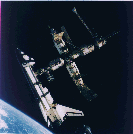


On January 8, 1997, Students at Harper McCaughan Elementary School in Long Beach, Mississippi (near Gulfport, on the Mississippi Gulf Coast) talked to American Cosmonaut Researcher Col. John Blaha who had been living and working aboard the MIR Space Station for 4 months. For nearly eight and one-half minutes, eight students fired question after question at John via the Amateur Radio link established directly between the school's cafeteria and the orbiting Space Station.
MIR came into view of the radio antennas at Harper McCaughan when it was over a point on the earth northwest of Casper, Wyoming, approximately 1:52 PM Central Standard Time. Amateur Radio Operator and Harper McCaughan Contact Coordinator Terry Jones, NZ8C, began calling John Blaha (KC5TZQ) 30 seconds before the time it came into view, as predicted by real-time computer orbit tracking models running at the school. This 30-second lead time was used to take advantage of possible radio frequency refraction through the edge of the earth's atmosphere that sometimes bends the signal slightly around the earth and makes it possible to contact an orbiting satellite when it is still a few degrees below the horizon, as seen at the school's antennas.
For nearly three minutes, Harper McCaughan called MIR with no response. With precious time ticking away in the 10 minute window in which Haper McCaughan would have its only opportunity to talk with John aboard MIR, the anxiety level increased dramatically with each call that got no response. Finally, 2:50 minutes after NZ8C started calling MIR, Col. Blaha responded with a loud and clear signal: "November Zulu Eight Charlie, Kay See Five Tee Zed Que! How Copy, Over!" A wave of both relief and excitement swept through the entire audience and the eight students who had been eagerly awaiting those words! Terry Jones gave a thumbs-up sign to his team and the students and handed to microphone to fourth grade teacher Barbara Carruba. Ms. Carruba conducted the students while they posed their questions and listened to the answers from space.
Contact with Col. Blaha continued uninterrupted, loud and clear all the way as MIR passed over a point 26 miles north of Pascagoula and on down over the Carribbean until it passed out of sight of the School's antennas at a point approximately 140 miles south of Kingston, Jamacia. As the signal from MIR faded on the last question, Jones took back the microphone and thanked Col. Blaha for his time and attention.
Analysis of the audio tapes and signal strength readings support the theory that a recent attitude adjustment of MIR plus Col. Blaha's primary responsibilities aboard MIR were the reason for the late accquistion of signal.

In all, the eight students asked a total of 14 questions, received answers to 13 of them, maintaining positive contact for 8:15 seconds. Below is a timeline of the contact events:
ELAPSED TIME (Min) EVENT ---------- -------------------------------------------------------------- 00:00 C-00:30 00:02 Began Calling KC5TZQ aboard MIR 00:30 C-00:00 - Predicted Rise Time (AOS) of MIR 02:50 Positive Contact Established with Col. Blaha aboard MIR 07:40 All Eight Students Completed First questions, Second Round of Questions Begin 07:40 First Lindenblad Uplink Test Attempt. Col. Blaha reqests repeat that was received on Lindenblad. Switched back to Beam Antenna 08:13 Second Lindenblad Uplink Test Attempt. Sucessful. Three Uplinks sucessfully conducted, two solid responses, third one noisy 09:30 End of Second Lindenblad Uplink Test. Switched back to Beam for remainder of contact 10:20 White noise creeping into audio, attempts to strengthen signal through polarization sense switching no longer effective. AOS imminent 10:40 Last Q/A exchange completed. End of useful communications 10:52 Last Question asked. Col. Blaha requests fill..He is noisy but still readable 11:03 Last Question repeat complete, Col. Blaha, barely readable, requests repeat again 11:05 Loss of Signal (LOS), contact complete. Questions Asked: 14 Questions Answered: 13 Lindenblad Uplinks: 3 Lindenblad Downlinks: 2 Total Positive Communications Time: 495 Seconds (8:15 minutes)

| EVENT | PREDICTED | ACTUAL |
| AOS | 19:52:06 | 19:54:26 |
| LOS | 20:02:30 | 20:02:41 |
| Contact Duration |
624 Sec. (10:24) |
495 Sec. (08:15) |
| Channel Usage |
79.3% |

In the near future, the file will be broken up into smaller sections, and a compressed, monophonic gzip version of the entire contact will be available for download.
